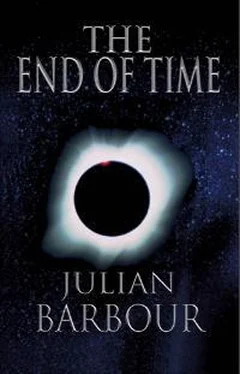BOX 16 An Email Dialogue
DOWKER. It seems to me that you provide no scheme for making predictions, and I would further claim that no such scheme can exist which contains the two aspects that are fundamental to your scheme: canonical quantum gravity (CQG) and the Bell version of the many-worlds interpretation (MWI).
BARBOUR. I think you are right, subject to what one means by prediction. I cannot make the kinds of prediction you want, and you correctly identify the reasons. I feel the arguments for CQG and MWI outweigh desire for predictions of the kind you would like.
DOWKER. I freely admit that I am rather attached to the notion of the universe (and I) having had, and being about to have, a continuous history. But my criticism here is not the absence of history in your approach, but, to repeat, that there is no way to make predictions about the results of our observations. In my view this is a deficiency that cannot be overcome. Whatever else science tells us about the world, it must allow us to make predictions about our observations that we can check.
BARBOUR. I am not sure we can impose such a criterion on Nature. The Greeks had the notion of saving appearances (finding a rational explanation for the phenomena we observe) that is already very valuable. You may be asking more of Nature than she is prepared to give.
DOWKER. In backing up this criticism I shall focus on the aspect that I am most familiar with and on which I have most confidence in my own views, which is the aspect of the interpretation of quantum mechanics. I am pleased that your book draws attention to the work of Bell on the many-worlds interpretation, since it has not had the recognition it deserves. In my view his version is the only well-defined many-worlds interpretation (I’ll call it BMWI) that exists in the literature.
BARBOUR. I agree it is well defined, but with reservations about the role of time. The time of an observation, like any other observable, must be extracted from present records. When you start to ask how that is done in practice and how Nature does put time into the records, I think things may become less well defined. I do believe that almost all physicists this century have blindly followed Einstein in declining to try to understand duration at a fundamental level. A lot of the first part of my book is about that. I think my position might be stronger than you realize.
DOWKER. I think that neither your version (which I’ll call JMWI) nor BMWI allows us to make predictions about what we observe (so I disagree with Everett’s statement ‘the theory itself predicts that our experience will be what it in fact is’). Let me take your version. There we have many configurations at time t . The most serious problem is that in a scheme like yours, in which all the possibilities are realized, there is no role for the probabilities. The usual probabilistic Copenhagen predictions for the results of our observations cannot be recovered. An excellent reference which analyses the MWI literature and the various attempts to derive the Born interpretation from MWI is Adrian Kent [1990, International Journal of Modern Physics , A5, 1745]. Adrian concludes that they fail. I’ll just state again the main reason that they fail: when all the elements in a sample space of possibilities are realized, then probability is not involved. Your idea is that it is the sample space itself, i.e. how many copies of each configuration are included in the sample space, which is determined by the (squares of the) coefficients of the terms in the wave function. That is all well and good (if bizarre). But there’s no reason then to call those numbers probabilities, and no way to recover the probabilistic predictions of Copenhagen quantum mechanics. In fact the MWI proponents themselves agree that the failure to reproduce the Copenhagen predictions is a problem and do try to address it, but without success.
BARBOUR. I accept that this is a strong critique. I nevertheless feel that my scheme does in principle have predictive strength. If you could see Platonia and Born’s probability density concentrated incredibly strongly on a tiny proportion of its points that all turn out to be time capsules as I define them and Bell describes them, would you not find that impressive, and something like a rational explanation for our experiences?
DOWKER. As well as the MWI, you base your conjecture of timelessness on the technical result that when a canonical quantization scheme is applied to general relativity, the wave function cannot contain the time. My understanding of the state of affairs in canonical quantum gravity is that, because of this, no one knows how to make the kind of predictions we’d like to make: explanations such as ‘What happens in the final stages of black hole collapse?’, ‘Why is the cosmological constant so very small?’, etc.
BARBOUR. I agree with your first example (and do not think it is too serious—there may be questions that it is just not sensible to ask), but in principle my scheme could predict that virtually all time capsules will appear to have been created in nearly classical universes with a very small cosmological constant. After all, that is what our present records indicate. If all probable configurations seem to contain records that indicate a small cosmological constant, I am okay.
DOWKER. My reaction to the situation is that formulating general relativity in a canonical way has been shown to be the wrong thing to do—we did what we weren’t supposed to—divided up space-time into space and time again. Even if it wasn’t clear from the beginning that it would be incredibly difficult to maintain general covariance of the theory whilst trying to treat space and time differently, I find the lack of any insight into how to recover predictions within the canonical quantum gravity program convinces me that we should look elsewhere for a quantum theory of gravity.
BARBOUR. As he was creating general relativity, Einstein was convinced general covariance had deep physical significance. Two years later, correctly in my opinion, he completely abandoned that position. In my opinion, general covariance is an empty shell (I say something about this at the end of Chapter 10 and in the notes to it). I believe it is not possible to give any meaning to the objective content of general relativity without saying how the three-dimensional slices in space-time are related to each other. That is the very content of the theory. That is why I think the arguments for canonical quantum gravity are very strong indeed. The constraints of the canonical theory are its complete content.
DOWKER. Having made my basic points, let me now just say that I find it incredibly hard to understand how, as a solipsist of the moment, you must view science and the scientific enterprise.
BARBOUR. Answered above I think. Science should explain what we observe. We habitually observe and experience time capsules. Even granting the real difficulties with calling the square of a static amplitude a probability, should it turn out that the Wheeler-DeWitt equation does strongly concentrate the square of the amplitude on time capsules, I think that would be an incredibly strong and suggestive result.
DOWKER. Take the idea that a good scientific theory should be falsifiable.
BARBOUR. I think my idea is falsifiable in the following sense. There may well be configurations of the universe with records of my idea and mathematical proofs that the Wheeler-DeWitt equation most definitely does not concentrate the square of the amplitude on time capsules. If I too am in them, I would have to say my proposal for an explanation of why we think time flows has failed.
Читать дальше












